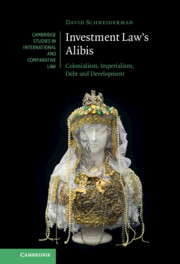Book contents
- Investment Law’s Alibis
- Cambridge Studies in International and Comparative Law: 168
- Investment Law’s Alibis
- Copyright page
- Dedication
- Epigraph
- Contents
- Acknowledgements
- Introduction
- 1 Colonialism of Investment Law
- 2 Imperialism of Investment Law
- 3 The Decline and Rise of Standards of Civilized Justice
- 4 The Stifling Threat of Debt
- 5 The Difficulty of Decolonizing Investment Law
- 6 Divesting for Development
- Conclusion
- Bibliography
- Index
- Cambridge Studies in International and Comparative Law: 168
Conclusion
Published online by Cambridge University Press: 21 July 2022
- Investment Law’s Alibis
- Cambridge Studies in International and Comparative Law: 168
- Investment Law’s Alibis
- Copyright page
- Dedication
- Epigraph
- Contents
- Acknowledgements
- Introduction
- 1 Colonialism of Investment Law
- 2 Imperialism of Investment Law
- 3 The Decline and Rise of Standards of Civilized Justice
- 4 The Stifling Threat of Debt
- 5 The Difficulty of Decolonizing Investment Law
- 6 Divesting for Development
- Conclusion
- Bibliography
- Index
- Cambridge Studies in International and Comparative Law: 168
Summary
By way of conclusion, the question is posed whether the investment treaty regime is capable of being liberated from its discredited ancestry in justifications that supported colonialism, imperialism, civilization, debt and orthodox development. Powerful discourses, such as ones underpinning the investment law regime, succeed and endure to the extent that they inhibit alternative accounts. Why should those proffering alternative readings be ignored or silenced when, cumulatively, the effects of this regime are everyday being made material? These discursive strategies are successful only in so far as citizens and states of the Global North insist on continuing to write the rules of the game, facilitating silence of the subjugated and refusing to acknowledge that the marginalized deserve a hearing via a genuine exchange that can form, per Quijano, the ‘basis of another rationality which may legitimately pretend to some universality’. Such a hearing must take place far away from the rarefied confines of conference rooms where investment claims are pursued or the corridors of power where international diplomacy exerts its force.
- Type
- Chapter
- Information
- Investment Law's AlibisColonialism, Imperialism, Debt and Development, pp. 171 - 179Publisher: Cambridge University PressPrint publication year: 2022

